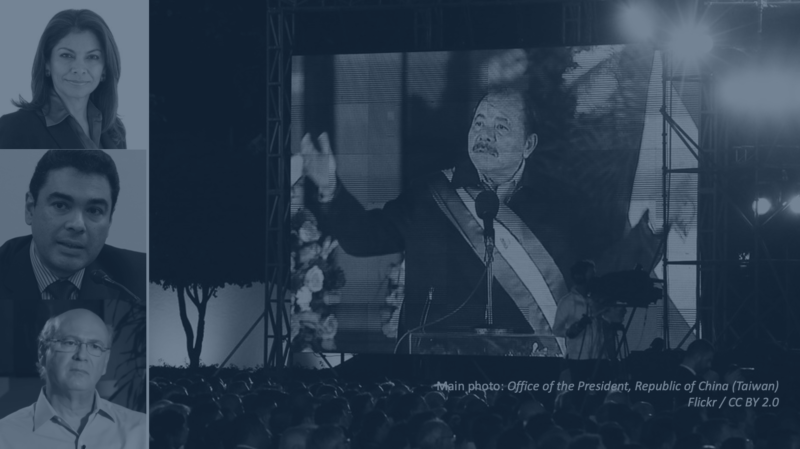
Violence & Impunity: Protecting Journalists in Colombia & Mexico
Violence against journalists is fortunately uncommon in many Latin American countries. But in some parts of the region it is of great concern.
As Nicaraguan President Daniel Ortega continues a relentless and unprecedented wave of repression against political opponents, the Inter-American Dialogue hosted the event “Nicaragua’s Wave of Repression: What Next?” on July 9 to discuss the political and economic impact of the Ortega regime, solutions to the ongoing crisis, and its potential impact on the region. Panelists included Laura Chinchilla, Former President of Costa Rica and co-chair of the Inter-American Dialogue; Carlos Fernando Chamorro, director of Confidencial; and Manuel Orozco, director of the Center for Migration and Economic Stabilization and Creative Associates International, and non-resident senior fellow of the Inter-American Dialogue. The event was moderated by Michael Shifter, president of the Inter-American Dialogue. The conversation explored the weakening of democratic institutions in Nicaragua, the viability of economic sanctions, and the regional impact of the humanitarian and political crisis on Nicaraguan emigration.
Carlos Fernando Chamorro opened the discussion by providing an expository analysis on the Ortega regime, its political and financial support system, and the impact of weakening democratic institutions and political efficacy. Chamorro summarized the current political crisis into four key developments: the elimination of political competition, the obstruction of political mobilization and organizational capacity, the strengthening of the police state, and the radicalization of the political process. Though Ortega’s supporters only number about one third of the electorate, they vary in economic status and often benefit from economic access to sectors reserved for his supporters. Furthermore, since Ortega has already survived the backlash from previous crimes, Ortega believes he will remain in power as long as he exercises control of the security forces, regardless of sanctions. However, Chamorro posited sanctions can be effective if they decisively target the economic pillars of the regime, and hamper the prospect of a political future of the regime. This includes freezing Ortega and Murillo family assets, disrupting payroll and internal financial government mechanisms, and the participation of the Central American Integration Bank and the Inter-American Development bank in economic sanctions.
Laura Chinchilla stressed the need for a more robust and comprehensive approach in actions against the regime. Noting Latin America has been “dragging their feet” on Nicaragua, she recommended a combination of diplomatic pressure and economic sanctions in order to obstruct international financial support and immobilize the Ortega-Murillo family assets. Though the latter has the potential to inadvertently affect the Nicaraguan population, accompanying sanctions with diplomatic pressure will mitigate the impact of sanctions on the Nicaraguan population and weaken the foundations of an already isolated regime. Due to the economic and political integration of the region, Latin America must collaborate with the international community to present a united front against Ortega, closing off strategic or longstanding diplomatic ties and utilizing all available diplomatic instruments in order to pressure the regime into negotiations and free and fair elections. Chinchilla cited the recent Organization of American States (OAS) resolution and the European Parliament sanctions as examples of this pressure. Finally, Chinchilla urged the international community to relay pressure on the Nicaraguan security forces by leveraging military assistance and issuing sanctions against high-ranking military officials.
The economic integration of the region is also a major factor in the context of migration. Manuel Orozco analyzed the political and economic implications of Nicaraguan migration on Latin America, as well as the Nicaraguan diaspora’s role as a channel for diplomatic pressure on the regime. Orozco noted that in order to understand the regional impact of the regime, migration must be contextualized with the loss of political and electoral efficacy, the current economic crisis, political instability, and state violence and repression. He stated that as many as 100,000 Nicaraguans may emigrate north this year. Due to the number of migrants to countries like Costa Rica and Mexico, Orozco claimed that an influx of humanitarian aid and increased economic integration in the Northern Triangle could be necessary. Orozco agreed with Chinchilla’s comments that the United States, OAS, International Monetary Fund (IMF), and other strategic actors in the region should utilize the diplomatic and economic instruments available in order to pressure the administration into negotiations, such as the RENACER and NICA acts. Furthermore, Orozco noted that the diaspora has played an important intermediary role politically and economically (remittances) that compliments pressure and sanctions from the United States and Canada.
The panelists expressed serious doubt at the prospect of free and fair elections and urged international bodies like the IMF and the OAS to take more urgent and comprehensive measures against the Ortega-Murillo regime. Chamorro echoed the panelists’ sentiment that the OAS declare that the upcoming November 7 elections are illegitimate as soon as possible. Allowing the regime to operate without major unified condemnation from key actors could encourage other autocratic usurpations of power in the region. Furthermore, the harmful influence Russia and Venezuela pose to the Nicaraguan governments and the region as a whole perpetuates the need for urgent action. Despite the many challenges the crisis poses to democracy throughout Latin America, Orozco’s comments encapsulate the need for firm resolve against the regime: “Accepting the status quo is basically accepting to live in a state of fear.”
Violence against journalists is fortunately uncommon in many Latin American countries. But in some parts of the region it is of great concern.
Citizen security remains a top concern for most Latin American governments as crime and violence spiral out of control and cripple political and economic institutions in the region.
Nicaragua is on the precipice.
 Main Photo: Office of the President, Republic of China (Taiwan) / CC BY 2.0
Main Photo: Office of the President, Republic of China (Taiwan) / CC BY 2.0